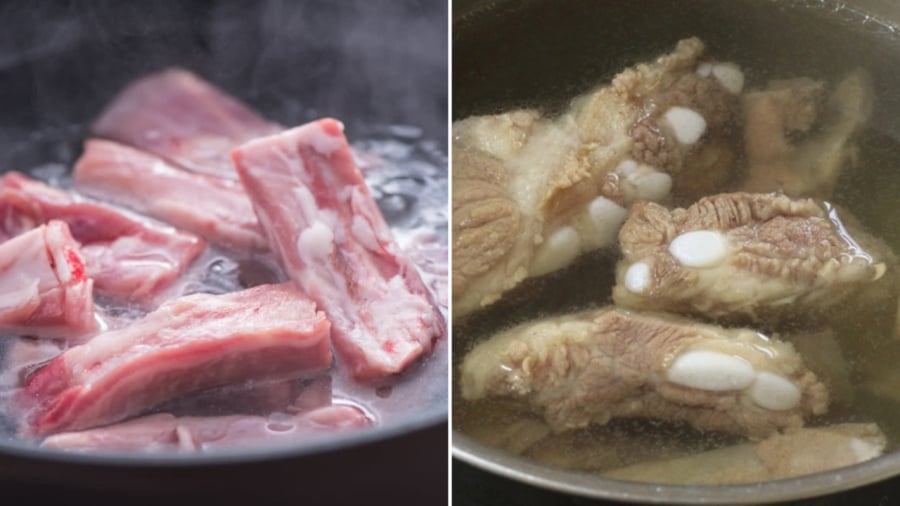When it comes to blanching bones or boiling meat, many people have the habit of scalding the ingredients to remove impurities and eliminate odors. Most people believe that doing so results in cleaner and more flavorful dishes. However, not everyone knows whether using cold or hot water for blanching bones is the better option.
According to experienced chefs and nutritional science, it is recommended to use boiling water for blanching vegetables and seafood, while bones should be scalded in cold water. This method helps remove impurities and eliminate odors without losing the nutrients in the food.
For meat, the choice between using hot or cold water depends on the dish you are preparing. Bones, in general, tend to contain a lot of blood, fat, soluble protein, and other impurities. These substances can easily make the broth cloudy. At temperatures between 60-70°C, proteins denature and precipitate. This precipitation process also drags out the impurities, resulting in the foam that rises to the surface when blanching bones. You can easily skim and remove it, cleaning the bones. Additionally, blanching helps eliminate some of the fat and amino acids that cause odors. As a result, many people find that blanching bones once before cooking makes the dish more fragrant and less pungent.

Blanching bones before cooking results in a clearer, more fragrant, and purer-tasting broth. When blanching and simmering bones, adding spices like ginger, onion, and wine can enhance the aroma of the dish.
If you use boiling water to blanch bones, the high temperature will cause the proteins to contract suddenly and become trapped within the bones. This traps the impurities inside as well, preventing their removal. The bone’s odor is also not eliminated. With this method, the broth is more likely to become cloudy, and it won’t have a pleasant aroma.
For meat, the choice between using cold or hot water depends on the type of meat and the dish being prepared. Typically, to improve the fragrance and effectively remove impurities, add the meat to the pot while the water is still cold. The effect is similar to blanching bones. Adding a little ginger, onion, or salt can help eliminate odors and enhance the flavor of the meat. If you are certain about the source of the meat and confident that it is clean, you can blanch it in hot water. This will lock in the nutrients, making the meat sweeter. Additionally, if you plan to use the meat broth for soup or as a base for other dishes, it is advisable to scald the meat in cold water first to remove impurities and eliminate odors. Then, proceed with the regular boiling process. This way, the broth will be sweeter and more flavorful, making the soup taste better.
For vegetables, blanching in boiling water helps retain their structure, nutrients, and attractive colors. Vegetables only need to be blanched for a few minutes before being removed and plunged into cold water to maintain their crispness and bright colors. Avoid blanching vegetables for too long, as they may become mushy and difficult to work with further. When blanching vegetables, adding a little salt and oil can enhance their luster and preserve their color.
In conclusion, for bones, starting with cold water is generally recommended to scald and remove impurities and odors. For vegetables, wait until the water boils before adding them to the pot. As for meat, you can choose between cold or hot water depending on your preferences and the dish you are preparing.





































